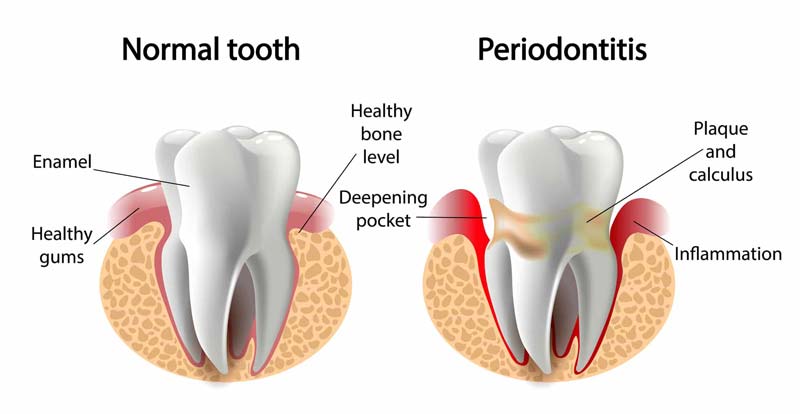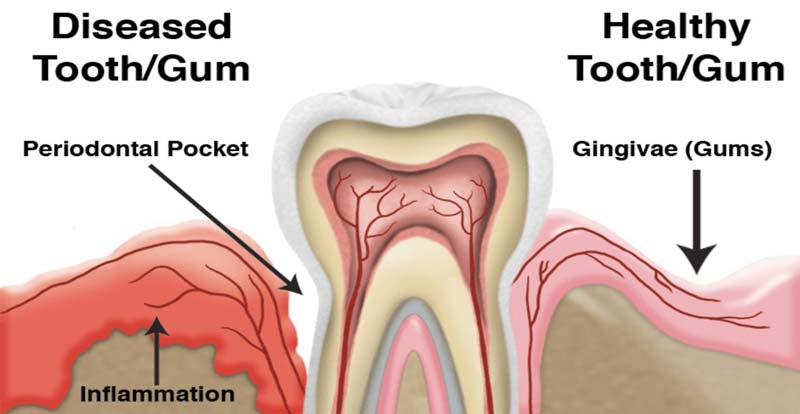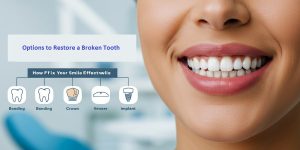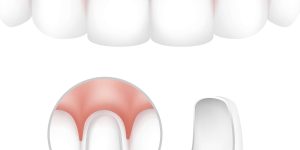Understanding Periodontal Disease Insights from Pearl Dental Group
Periodontal disease, commonly known as gum disease, is a condition that impacts many people, often without them even knowing it. It begins with bacteria in the mouth forming plaque on the teeth, leading to gum soreness if not properly cleaned. Over time, this can develop into more serious conditions affecting the gums and bones that support the teeth.
At Pearl Dental Group, we are dedicated to educating our patients about periodontal disease, its causes, symptoms, how to prevent it, and ways to treat it. We aim to empower you with the knowledge to maintain optimal oral health through this comprehensive guide. Pearl Dental Group offers advanced periodontal disease treatments to restore your gum health and preserve your smile’s longevity. Trust our experienced team to provide personalized care and effective solutions for your periodontal concerns. Pearl Dental Group is proud to be recognized as a top-rated dentist in Toronto, delivering exceptional dental care with a commitment to excellence and patient satisfaction. Trust your smile to our experienced team for superior service and results.
What is Periodontal Disease?
Periodontal disease is a condition that gets worse over time. It can be classified into two main stages: gingivitis and periodontitis. Gingivitis, the earliest stage, is characterized by gum inflammation without bone loss. If not treated, it can advance to periodontitis, where the internal layer of the gum and bone pull away from the teeth, creating spaces that can get infected. This can lead to tooth loss and has also been linked to other health issues, such as heart disease and diabetes.
Related Post: Gum Disease Therapy in Toronto
Causes and Risk Factors of Periodontal Disease
Knowing the reasons and recognizing the risk factors for periodontal disease can help its prevention and management. Plaque is the leading cause of gum disease, but many factors can increase your risk of getting it.
Gum disease mainly comes from plaque, a sticky, transparent layer of bacteria that always builds up on our teeth. If we don’t brush and floss away plaque regularly, it can turn into tartar, a much tougher material to clean. The bacteria in plaque release harmful toxins that make the gums swollen and inflamed, causing different levels of gum disease. Several factors can increase your risk of developing periodontal disease, making it crucial to be aware of these to take steps to prevent it.
- Poor Oral Hygiene:
Insufficient brushing and flossing allow plaque to build up along the gum line, increasing the risk of periodontal disease.
- Tobacco Use:
Smoking or chewing tobacco is one of the most significant risk factors for the development of periodontal disease. Tobacco use can also reduce the chances of successful treatment.
- Inherited Risk:
Genetics can affect how likely you are to get gum disease. Even with careful cleaning of your mouth, individuals with a family history of periodontal disease may be at a higher risk.
- Illnesses:
Certain conditions like diabetes, cancer, and HIV can affect the immune system’s ability to fight infection, including the bacteria that can cause periodontal disease.
- Medicines:
Some drugs, particularly those that cause dry mouth or gum changes, can affect oral health. Medications for depression, certain heart medications, and birth control pills can all have side effects impacting gum health.
- Hormonal Changes:
Changes in hormone levels during puberty, pregnancy, menopause, and monthly menstruation can make gums more sensitive to gum disease.
- Poor Nutrition:
A diet lacking essential nutrients can damage the body’s immune system, making fighting off infections, including periodontal disease, harder. Vitamin C deficiency, in particular, is linked to gum inflammation and bleeding.
Understanding these risk factors is critical to taking positive steps toward maintaining good oral health. Regular dental check-ups, cleanings, and good habits for keeping your mouth clean can significantly reduce the risk of developing periodontal disease. Suppose you have concerns about your risk factors or symptoms of periodontal disease. In that case, the team at Pearl Dental Group is here to give you a comprehensive approach to ensuring your oral health is maintained at its best.
Read More: Most Common Causes of Gum Disease
Signs of Periodontal Disease
Recognizing the symptoms of periodontal disease is crucial for quick action and proper handling of this severe but widespread issue. Symptoms may vary, but understanding them in detail can help you seek timely dental care. Here’s a more comprehensive explanation of the signs linked to gum disease:
- Red, Swollen, or Tender Gums:
This is often the first sign of gum disease. Healthy gums are firm and pink. When inflamed due to plaque buildup, they can become red, swollen, and very sensitive. This redness is the body’s response to the harmful bacteria in plaque.
- Bleeding Gums While Brushing or Flossing:
Gums that bleed easily during routine brushing or flossing are a clear sign of gum swelling. This symptom should not be ignored, as healthy gums do not bleed. Bleeding can indicate that plaque and tartar buildup have caused irritation and infection in the gum tissues.
- Gums pulling back or teeth looking longer:
Gum recession happens when the edge of the gum tissue around the teeth wears away or pulls back, showing more of the tooth or the tooth’s root. This can make your teeth appear longer than usual. Receding gums are a sign of periodontal disease development and can lead to sensitivity and other oral health issues.
- Loose or Shifting Teeth:
As periodontal disease progresses, the bones that support the teeth can be lost, leading to loose or shifting teeth. This symptom is more common in the later stages of periodontal disease and can significantly impact how your bite feels and how teeth fit together.
- Persistent Bad Breath or Bad Taste in the Mouth:
Caused by the bacteria in plaque, persistent bad breath, or a bad taste in the mouth can be signs of periodontal disease. These symptoms are due to the decay and dirt below the gums and can remain even with regular brushing and flossing.
- Changes in the Way Teeth Fit Together When Biting:
As periodontal disease progresses, it can affect the alignment of your teeth. You may notice a change in how your teeth fit together when you bite. This is due to the shifting of teeth due to bone loss around the teeth.
Each symptom can show the presence of periodontal disease and warrants a visit to your dental care provider for a thorough examination and appropriate treatment. Early detection and intervention are crucial to managing periodontal disease and maintaining good oral health. If you experience any of these symptoms, do not hesitate to contact Pearl Dental Care in North York for a consultation.
Preventing Periodontal Disease
Preventing periodontal disease starts with good oral hygiene practices, including regular brushing, flossing, and dental check-ups. Early detection through routine dental examinations is key to managing the condition effectively. During these visits, your dentist can remove plaque and tartar that can’t be cleaned at home and check for signs of gum disease.


Treatments For Periodontal Disease
Decay and dirt below the gums can remain even with regular brushing and flossing. Treatment for periodontal disease depends on the severity of the condition. Professional cleaning might be enough early, but more advanced cases could require surgery. Regular check-ups can help catch the disease early, making treatment more effective. Treatment options may include:
- Professional Cleaning:
Regular cleanings by a dental hygienist can remove plaque and tartar contributing to gum disease.
- Deep Cleaning of Teeth and Roots alignment and Root Planing:
This deep-cleaning, non-surgical procedure removes plaque and tartar from above and below the gum line and smooths rough spots on tooth roots where bacteria gather.
Read More: Root Canal Treatment in North York
- Medications:
In some cases, antibiotics or antimicrobial mouth rinses may be given to help control bacterial infection.
- Surgery:
Advanced cases of periodontal disease may require surgical options, such as flap surgery to take out tartar from deep spaces or bone and grafts to repair any missing bone and gum.
Consider that lifestyle changes can play a significant role in managing and preventing periodontal disease. Quitting smoking, improving dietary habits, and managing stress can all contribute to better oral and overall health.
Read More: Solutions for Missing Teeth
Conclusion
This comprehensive guide to periodontal disease is designed to provide the information you need to understand, prevent, and manage this condition. At Pearl Dental Group, we know how crucial it is to keep your gums healthy for overall health and happiness. By educating our patients about periodontal disease, we aim to promote early detection and effective management of this common condition. Remember, good oral hygiene, regular dental visits, and a healthy lifestyle are your strongest protection against gum disease. We encourage you to contact us if you have any concerns about your oral health. Our experienced professionals are here to help you every step on your journey to optimal oral health.

Booking An Appointment
Book an appointment with Pearl Dental Group today and experience top-quality dental care in a friendly and professional environment.
Toothaches can be caused by various factors, including dental decay, tooth infections, gum disease, tooth fractures, dental abscesses, grinding or clenching teeth, and even sinus infections.
Home remedies for temporary toothache relief include rinsing with warm salt water, applying a cold compress to the outside of the mouth, taking over-the-counter pain relievers, and using clove oil or peppermint tea bags to numb the area.
It’s essential to see a dentist if you experience persistent or severe tooth pain, swelling around the tooth or gums, fever, foul-tasting drainage from the infected tooth, or difficulty swallowing or breathing due to swelling.
A dentist can diagnose the underlying cause of your toothache and provide appropriate treatment, which may include dental fillings, root canal therapy, tooth extraction, or prescription antibiotics for infection.
Maintaining good oral hygiene habits, such as brushing and flossing regularly, attending regular dental check-ups, avoiding sugary and acidic foods, wearing a mouthguard to prevent teeth grinding, and quitting smoking can help prevent toothaches.
Contact Us
Pearl Dental Group: Specializing in crafting radiant smiles and elevating dental health for over 30 years! Are you curious to know about sparkling smile secrets? We at Pearl Dental Group provide comprehensive and high-quality dental services through our expert team. Pearl Dental Group is ready to provide you with a wide range of services in both general and cosmetic dentistry in Toronto. Our professional dentists prioritize your health and the aesthetics of your smile.
Pearl Dental Group provides a comprehensive range of dental services, including teeth whitening, root canal treatments, dentures, dental implants, dental crowns, gum disease therapy, dental veneers, dental bonding, dental bleaching, pediatric dentistry, tooth extraction, and more, all delivered with the highest quality and affordability.
Book your appointment today and experience a professional dental care service in a warm and friendly place. Contact us; we are waiting for you.
Read More: Cosmetic Dentist in Toronto








